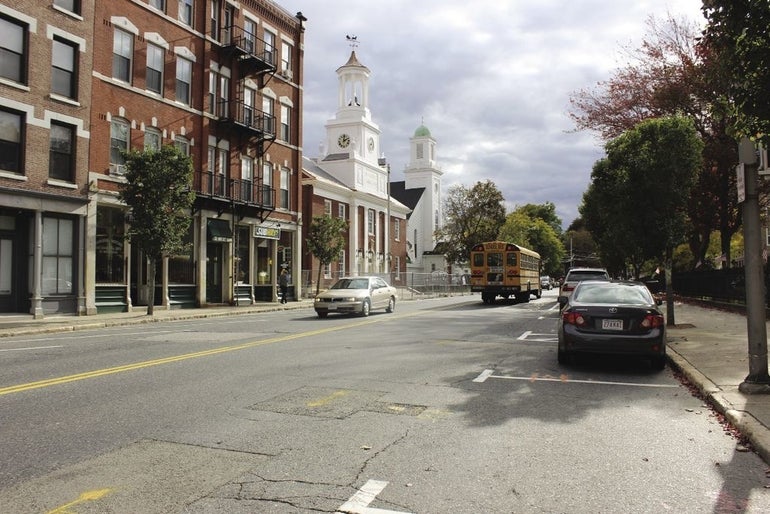On the heels of a 2010 law that one senator calls a “mess,” the Senate next week is set to consider a bill banning driving while holding a handheld electronic device.
The 2010 law banned texting while driving but distracted driving associated with the use of electronic devices remains a safety issue as drivers continue to simultaneously use their hands, eyes and brains to simultaneously use increasingly capable smartphones and navigate the roads of Massachusetts.
Before adjourning for the holiday weekend, the Senate put on its calendar for Thursday, Jan. 21 legislation (S 2093) representing a redraft of a bill (S 2032) that cleared the Transportation Committee last October. Amendments to the bill are due by Tuesday at 2 p.m.
“We made a mess in 2010 by doing a half-baked law,” Montigny, the Senate’s assistant majority leader, told the News Service Thursday. “All you have to do is get in the car on any given day, a significant number of people are breaking the law and the law is very difficult to prove without subpoenaing phone records. . . . No one who is tempted to break the law is really all that troubled by the law as written.”
Distracted driving, including instances related to cell phone use, accounted for 26 percent of the 30,000 lives claimed in motor vehicle crashes in the United States during 2013, according to Montigny’s office, which cited statistics from the National Safety Council.
Last February, the AAA Foundation for Traffic Safety released Massachusetts survey results that found that 60 percent of drivers using handheld cellphones said it was unacceptable to talk on a cellphone while driving but 78 percent admitted to doing so in the previous 30 days. Also, 97 percent of the 350 Massachusetts drivers surveyed said it was wrong to type text messages or email while driving, but 28 percent admitted to doing so during the previous 30 days.
Montigny (D-New Bedford) and Cynthia Creem (D-Newton) sponsored the bills that led to the Senate proposal, which was released Thursday from the Senate Rules Committee that Montigny chairs. The latest version of the bill bans drivers from using a mobile electronic device unless the person is using the device in a hands-free mode and not touching or holding the device except to “activate, deactivate, or initiate a feature or function.”
The bill is specific in its wording. It states: that no vehicle operators “shall use a mobile electronic device or other device capable of accessing the internet to compose, send or read an electronic message or to input information by hand into a global positioning system or navigation device while operating such vehicle. An operator of a motor vehicle who holds a mobile electronic device to, or in the immediate proximity of the operator’s head while operating such vehicle shall be presumed to be in violation of this section. For the purposes of this section, an operator shall not be considered to be operating a motor vehicle if the vehicle is stationary and not located in a part of the roadway intended for travel.”
Under the bill, violators would face a $100 fine on first offense, $250 for a second offense and $500 for third and subsequent offenses. Third and subsequent offenses would also be considered moving violations for insurance calculation purposes.
Drivers could present as an “affirmative defense” evidence that their use of the device was required for emergency purposes, such as to report their vehicle was disabled, that medical assistance was required, that police, fire or other emergency services were necessary for the driver or passenger, or because of a disabled vehicle or accident on the roadway.
The state’s ban on texting while driving took effect in September 2010, including a ban on cell phone use while driving by 16- and 17-year-olds. At the time, former Gov. Deval Patrick called the practice “seriously unsafe” and said the law “means police are going to take it seriously.” Former Transportation Secretary Jeff Mullan called distracted driving associated with electronic devices a “growing menace.”
On Thursday, Montigny said the 2010 law was “one of the most irresponsible solutions to a deadly problem” and subsequently diminished the pressure on lawmakers to pass stronger laws such as those in place in Connecticut, New Hampshire and New York.
Montigny said it’s difficult for police to enforce the texting ban because the law still permits drivers to make phone calls and hold their devices to their ears.
“Infractions in Massachusetts are nil and yet I believe very strongly that exponentially more people are using mobile devices since the passage of the law,” Montigny told the News Service. “The world is much more aggressive in this area. The devices are just more prevalent. You can easily afford a mobile device where you can do lots of things that can cause you to be distracted from driving. People are spending far more time on mobile devices. They’re attached to people’s hands and ears.”
If the Senate bill can clear that branch, the prospects for a bill reaching Gov. Charlie Baker’s desk would be strongly enhanced. The Massachusetts House last November gave initial approval to a bill (H 3315) that would prohibit drivers from using hand-held cellphones except in emergency situations. The House bill could face amendments and needs a second favorable vote to reach the Senate.
Attorney General Maura Healey said last year that she supports legislative measures that would limit cellphone use by drivers to hands-free devices only. “What I see all the time as I am on the road are people of all ages on their phone, texting, totally distracted,” Healey said on WGBH’s Boston Public Radio. “I think it’s a serious problem and one we should take more seriously here in the state.”

